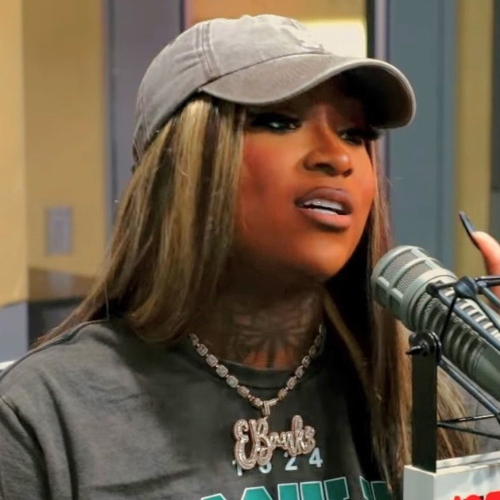Cherelle Griner didn’t exactly plan on landing national attention, but life apparently had other ideas. One day, she was working quietly on behalf of kids caught up in America’s juvenile justice system—dedicated but far from tabloid fodder—and then, almost out of nowhere, everything flipped. When her wife Brittney Griner’s freedom came under threat abroad, Cherelle suddenly found herself at the very center of a firestorm no one could have predicted. Friends say it was like watching someone step into a spotlight they never asked for, juggling frantic diplomacy calls with relentless newscasts and, through it all, refusing to back down from her principles.
Long before she became a headline, Cherelle already had a reputation among her colleagues for being laser-focused on kids and restorative justice. Ask anyone who worked beside her and you’ll hear the same thing: “She doesn’t quit.” She’s always been set on changing a broken legal system—making it not just fair, but actually useful for the young people tangled up in it. And then she became a mom, which, not surprisingly, kicked that commitment into high gear. Those who know her best say her vision for a safer world now has a very specific face: her son’s.
Cherelle Griner’s Groundwork: Where the Real Work Happens
Inside legal circles, Cherelle is that rare figure who doesn’t mind diving into the messiest corners. Juvenile justice reform isn’t glamorous—there are no easy answers, just stories that break your heart. Yet, that’s where she wants to be. She’s constant about it, always pushing for an approach that heals instead of punishes, tackling issues others would rather leave alone. “She believes real justice actually means making things right, not just making things hurt,” one coworker told me—not in a starry-eyed way, but because she’s seen what works.
Her hallmark? Diversion. Not just talking about it, but fighting to make it a reality. She’s one of those advocates who doesn’t accept a system that chews up teenagers and spits them out. According to other reformers, Cherelle constantly reminds everyone, “These are kids, not lost causes. Give them a reason to hope, and they’ll surprise you.”
If you’re wondering about her background before the Griner name entered every living room TV, she was Cherelle Watson, and she was already a standout. Ivy League-trained, always up for questioning “the way things have always been,” she was making waves in legal circles long before anyone thought to ask about her home life. Then came her marriage to WNBA superstar Brittney Griner, and suddenly, all those years of quiet groundwork got a very public microphone.
| Career Milestone | Year | Significance |
|---|---|---|
| Legal Career Focus | Pre-2022 | Juvenile justice reform and restorative justice advocacy |
| Public Advocacy Campaign | 2022 | International attention during Brittney’s detention |
| Motherhood Journey | 2024 | Welcomed son Bash, expanding family advocacy |
| Power Mom Recognition | 2024 | Marie Claire feature highlighting her influence |
The 2022 Advocacy Earthquake
Here’s what changed everything: in early 2022, Brittney Griner was snatched up by the Russian legal system, and the story got dark fast. Cherelle had to figure out—basically instantly—how public she was willing to make their private pain. She went public. Loudly. The move turned her into a linchpin for a campaign that captured international attention. “There was just no way I could stay quiet,” she later admitted. Her legal training? Suddenly, it was as useful on Good Morning America as it was in a courtroom.
Pretty quickly, Cherelle was out front: organizing, orchestrating, making sure people in power couldn’t drop the issue. She lined up interviews whenever possible, kept Brittney’s face in the news, crafted careful arguments that, in her lawyerly way, translated pain into policy. “She knows how to get folks to care—and she stuck with it until something cracked,” is how one advocate described it.
Odd as it sounds, even the political chaos didn’t throw her off her stride; there was composure when most people might have come unglued. That became something she was known for—her capacity to humanize the story, keeping the focus on Brittney as a wife and a daughter, not just a pawn in a geopolitical mess. Eventually, her passion and public strategy played a role in the deal that brought Brittney home.
Reform in the Trenches: Juvenile Justice and Real Second Chances
Step away from the headlines and it’s clear Cherelle’s always been relentless about fixing how we treat kids in crisis. She’s the kind of advocate who doesn’t just talk theory—she hands out second chances, pushing programs designed to turn young lives around instead of letting them rot in cells. Ask her about her philosophy and she’s straightforward: “We owe these kids more than just discipline—we owe them a real future.”
None of this is window dressing. Her ideas on restorative justice—meaning, actually helping everyone involved heal from a crime, not just slapping on punishments—are put into practice every day. And apparently, the numbers back it up: fewer repeat arrests for teens who’ve been through her programs. Each kid gets something tailored—the counseling, the education, the guidance they honestly need to break the cycle.
Something else she’ll tell you, probably over coffee, is that the science about brain development is clear. Young people aren’t just misbehaving adults, they’re still learning who they’ll become, well into their twenties. She repeats it to anyone who’ll listen: “Punishment isn’t the answer—rehabilitation is.”
A Moment That Touched the Culture
Think about it: a personal tragedy, blown up so big that it forces a bigger conversation. That’s been the real undercurrent of Cherelle’s rise. Instead of drawing a line between her private life and her work, she just folded the two together. When legal commentators talk about her, they’ll mention how seamlessly she bridges her home life with the courtroom, bringing both authority and raw honesty to the table. “She’s shifting the entire conversation—on diplomacy, on justice, on what families actually face,” said one attorney who’s been watching closely.
So here’s what’s happening: her family’s fight has put age-old problems on blast. Suddenly, there’s more mainstream talk about actual justice for families and what broken systems do to the people stuck inside them. Cherelle, in a way, has become the voice lots of folks were waiting for.
Bash’s Arrival (and the Revolution at Home)
Now, with a baby in tow (adorably named Bash), Cherelle’s perspective has shifted again. Balancing nap schedules and legal initiatives is hardly simple, but it’s deepened her sense of what’s at stake. Motherhood, she says, puts everything in sharper focus—she doesn’t just represent families in crisis, she is one.
She’s talked about how this new chapter has made her rethink the meaning of empathy for parents whose lives get turned upside down by the justice system. “I’m living it now,” she’s quick to mention, “and it’s changed how I listen.”
And on the public front? Cherelle and Brittney are upending what it looks like to be a queer family in America, sharing parts of their journey without letting public curiosity consume everything. Their openness has drawn respect, both for its courage and its sense of boundaries—something a lot of onlookers have called overdue.
| Advocacy Focus | Target Population | Key Outcomes |
|---|---|---|
| Restorative Justice | Juvenile offenders | Reduced recidivism, community healing |
| Diversion Programs | At-risk youth | Alternatives to incarceration |
| International Advocacy | Detained Americans | Successful diplomatic resolution |
| Family Representation | LGBTQ+ families | Increased visibility and acceptance |
The Ongoing Spotlight
Marie Claire called her a “power mom,” and while those magazine nicknames can be a little much, in her case it almost fits. Lately, Cherelle’s showing up everywhere—one day in a suit on a legal panel, the next recording a candid Instagram post in sweatpants, baby in her arms. She’s become strangely relatable in a world where public figures often seem out of reach: strategizing one minute, reading bedtime stories the next.
People adore the sneak peeks into daily life with Brittney and Bash—family photos that toggle gracefully between public encouragement and moments kept just for them. “They make it look possible to be both prominent and private,” as one fan put it, a balance that’s gotten rarer by the year.
Professionally, her increased profile has opened doors—actual access, big partnerships, and sudden attention for juvenile justice reforms that were previously hard sells. The path she’s carved out shows what can happen when someone uses hard-earned visibility to push for systemic change, not just personal gain.
Wrapping It Up
Cherelle Griner’s journey—honestly, it’s something. From legal wonk to someone whose name rings out in homes across the country, not because she wanted fame, but because circumstances left her no choice. People who know her (and those who just follow her story) say she’s managed to blend real, on-the-ground expertise with that vulnerable, lived-in perspective that policy conversations are usually missing.
Her own family’s struggle has become a springboard to something larger: not just talk, but actual movement on things that matter. And if nothing else, she stands as proof that sometimes, adversity doesn’t break you—it just pushes you further into your purpose.
What’s next? Who knows. Cherelle’s record so far suggests she won’t be stepping away from tough battles, especially now that she’s got even more reason at home to keep going. One thing’s for sure: her fight for justice doesn’t look like it’s slowing down any time soon.










